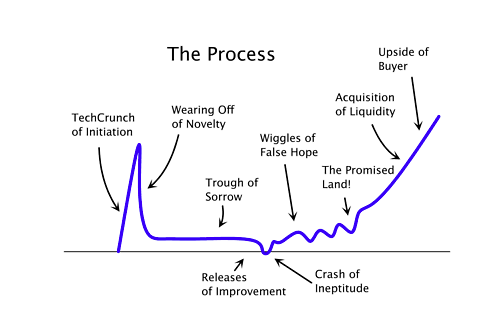What Exactly is Growth Hacking?
I just completed a course on Udemy called “Growth Hacking: Lean Marketing for Start Ups”. I’ve been curious about this topic since I first heard about it in late 2012, so I decided to learn more. Below I’ll attempt to summarize some basics - including origin of the term, a growth hacker’s key responsibilities, and what his or her process might look like.
What is Growth Hacking?
Growth hacking is a set of tactics and best practices for dealing with the problem of user growth for early stage start ups. Growth hacking can also be referred to as “lean marketing”, or the application of lean principles to the idea of growth.
Who are these Growth Hackers?
A growth hacker is a hybrid of a marketer and a programmer. They can be responsible for performing the following duties, though need will obviously vary from company to company:
- Landing Page Optimization
- Product Management
- SEO
- Onboarding
- Email Marketing
- UX
- PR
- Behavioral Economics, and most importantly
- Analytics - the foundation for all else.
Where did this term come from?
In 2010, Sean Ellis coined the term “Growth Hacker” on his Startup Marketing Blog. A good early example of a growth hack (aside from Yahoo’s famous “P.S. I Love You. Get your free email at Hotmail.” example in 1996) is AirBNB. A couple of years ago, someone at AirBNB reverse engineered a “Post to Craigslist” feature that ended up driving thousands of visitors to AirBNB from Craigslist. It was free, and it worked wonderfully. A traditional marketer would likely not have thought to do this, nor would they have been equipped with the know-how to execute the plan themselves.
Why do we need Growth Hackers?
Many start ups face a similar problem in that they build an awesome product, they launch it, and then no one uses it. Maybe they have an initial “Tech Crunch of Initiation” (a spike of users signing up because they read about you on some hot blog), but no one comes back or becomes active, and you don’t know why. You are in the “Trough of Sorrow”, as diagrammed by Y-Combinator founder Paul Graham in the graph below.

When this failure to launch-in-a-big-way happens, you are faced with several options. Do you pivot? Do you keep adding new features? Do you experiment with other marketing channels? Do you try to target a different demographic?
According to Growth Hacking (and Lean Start Up principles), continuing to ship features is the worst possible decision, as you’re compounding on the problem and not discovering where the issues truly lie.
User States & The Growth Hacking Funnel
The key to discovering what's specifically wrong with your product (and why it’s not being adopted by throngs of people) is to map it’s user life cycle.
User States:
- User hears about your product
- User visits your site
- User creates an account
- User visits again later
- User refers a friend
- User pays you… Maybe.
The growth hacker’s job is to figure out how to move a user from one state to the next. The way to do this is to break the flow into discrete stages. Enter, the Growth Hacking Funnel:
- Acquisition
- Activation
- Retention
- Referral
- Revenue
Once this funnel is established and you know what it looks like for your company & product, the next step is to measure conversions at each point along the funnel.
If you discover that 10% of the people who come to your site create an account (activate), 2% come back (retention), 1% of those people invite a friend (referral), and 1% sign up for a paid subscription (revenue) - your problem is in retention. There is no point in focusing on acquiring more users if your problem lies in activation, retention, referral, or revenue… And this is the moral of Growth Hacking. Growth hackers have developed tactics for optimizing at every stage along the funnel.
A/B Testing & More
In order to run a proper experiment, one must always have a control group & a test group. This is nothing new. There are many resources available to do this well, including Unbounce, KISSMetrics, & MixPanel. These are all examples from the Udemy course, but I know from experience that Optimizely also does this well.
Mattan Griffel (the course instructor) was lovely in providing some great growth hack examples & companies who focus on conversion, but I’m not going to share those here. For a more thorough look at my notes from this class, and some additional Growth Hacking resources, feel free to check out this Google Doc. Knowledge is good!
Follow my blog for more - Analytics & Marketing